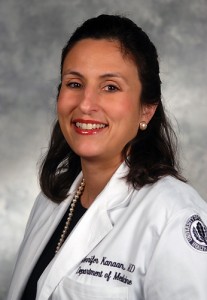
As the end of daylight saving time approaches, with the prospect of gaining an extra hour of sleep this weekend, physicians from the UConn Health Sleep Disorders Center discuss efforts to modify school start times in recognition of adolescents’ sleep habits.
Drs. Jennifer Kanaan and Daniel McNally have been to several towns in recent years to advocate for school start times to be pushed back to be more in sync with students’ body clocks. Kanaan, who until last year lived in Newtown, had worked with that school district to lay the foundation for later school start times for high school and middle school students. This year Newtown High School and Newtown Middle School moved their school day back a half hour, to begin at 8 a.m. instead of 7:30.
Q: Why the push for adolescents to start school later?

McNally: As kids progress from elementary to middle to high school, their school start times become earlier, and this is counter to their biological clocks. When they become adolescents and teenagers, they become vulnerable to what we call sleep phase shift – their body clocks tell them to go to bed late and wake up late. Their need for sleep goes up with adolescence, not down. But in reality, teenagers don’t get the sleep they need. So really, high school should be starting the latest, not the earliest. There is a scientific basis to it.
Q: As you go to school districts to make the case, how do the communities receive your arguments?
Kanaan: One of the concerns is the busing, and the costs associated with changing it. The way Newtown got around it was, they went from a three-tiered bus system to a two-tiered one, where middle and high school are bused together. Ridgefield has been considering flip-flopping elementary and high school. But that creates controversy, because it would have kindergarteners starting at 7:30 a.m., which means they’d have to be on the bus as early as 6:45. And so much of the local workforce is high school students, so that’s another consideration. Child care becomes an issue too, when the younger kids get home before the older kids. It’s change, and change is always hard.
McNally: The New York Times ran a piece in September citing a study by the Brookings Institute which concluded that high school students who start school later and get more sleep will reach greater academic achievement and improve their lifetime earning potential by a margin that far outweighs the increased transportation costs. It argued that it isn’t just that it makes sense biologically or it makes sense by performance in school, it actually would work out financially in the long term.
Q: If the science is there, how do we get past the resistance to change, the interfering with after-school sports and jobs, and the busing issues?
Kanaan: A lot of times what we find is, the change can be more powerful if the students are aware of some of the literature and understand the importance of sleep – if they’re a knowledgeable buyer, for lack of a better term. If they understand how to power down devices, and they understand not to sleep in on weekends, and a lot of the stuff that we talk to our patients about, if they’re doing that on a routine basis, they’re going to get a bigger bang for their buck. Knowing that, we’re trying to develop personalized school sleep curriculums.
Q: Besides Newtown and Ridgefield, which Connecticut school districts have moved back school start times, or are considering it?
Kanaan: To my knowledge, Wilton was the first to do it. Greenwich also just moved back high school and middle school this year. New Canaan is looking into it. West Hartford has explored it, and I’ve heard anecdotally a few other towns might be thinking about it too.
Q: As long as most schools stay on their traditional schedules, what’s your advice for parents?
McNally: We’ve known for a long time that if adolescents’ body clocks had their way, they’d go to sleep at midnight or later and sleep for hours past the opening school bell. Households that make sleep a priority will be much better off than those where everyone is sleep-deprived and not functioning at their highest level.
Kanaan: We are shortchanging our kids when we allow them to be sleep-deprived. Inadequate sleep can lead to academic difficulties, social difficulties, and family difficulties. Those who get enough sleep will do better in school, better in sports, and better in their relationships. Dr. McNally and I feel passionate about the importance of sleep and the importance of children getting appropriate both quality and quantity of sleep. From a personal standpoint, the Sandy Hook tragedy really taught me how powerful sleep can be as a recovery tool. That’s one of the reasons I believe so strongly in the power of sleep.



